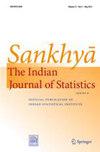Black-box optimization on hyper-rectangle using Recursive Modified Pattern Search and application to ROC-based Classification Problem
IF 0.7
Q4 STATISTICS & PROBABILITY
Sankhya-Series B-Applied and Interdisciplinary Statistics
Pub Date : 2023-10-12
DOI:10.1007/s13571-023-00312-w
引用次数: 1
Abstract
In statistics, it is common to encounter multi-modal and non-smooth likelihood (or objective function) maximization problems, where the parameters have known upper and lower bounds. This paper proposes a novel derivative-free global optimization technique that can be used to solve those problems even when the objective function is not known explicitly or its derivatives are difficult or expensive to obtain. The technique is based on the pattern search algorithm, which has been shown to be effective for black-box optimization problems. The proposed algorithm works by iteratively generating new solutions from the current solution. The new solutions are generated by making movements along the coordinate axes of the constrained sample space. Before making a jump from the current solution to a new solution, the objective function is evaluated at several neighborhood points around the current solution. The best solution point is then chosen based on the objective function values at those points. Parallel threading can be used to make the algorithm more scalable. The performance of the proposed method is evaluated by optimizing up to 5000-dimensional multi-modal benchmark functions. The proposed algorithm is shown to be up to 40 and 368 times faster than genetic algorithm (GA) and simulated annealing (SA), respectively. The proposed method is also used to estimate the optimal biomarker combination from Alzheimer's disease data by maximizing the empirical estimates of the area under the receiver operating characteristic curve (AUC), outperforming the contextual popular alternative, known as step-down algorithm.基于递归修正模式搜索的超矩形黑盒优化及其在roc分类问题中的应用
在统计学中,经常遇到多模态和非光滑似然(或目标函数)最大化问题,其中参数有已知的上界和下界。本文提出了一种新的无导数全局优化技术,可用于解决目标函数不明确或其导数难以或昂贵的问题。该技术基于模式搜索算法,该算法已被证明是有效的黑盒优化问题。该算法通过从当前解迭代生成新解来工作。新的解是通过沿着约束样本空间的坐标轴进行运动来生成的。在从当前解跳到新解之前,目标函数在当前解周围的几个邻域点上进行评估。然后根据这些点的目标函数值选择最佳解点。并行线程可以使算法更具可扩展性。通过优化多达5000维的多模态基准函数来评估该方法的性能。该算法比遗传算法(GA)和模拟退火算法(SA)分别快40倍和368倍。该方法还用于通过最大化接受者工作特征曲线(AUC)下面积的经验估计,从阿尔茨海默病数据中估计最佳生物标志物组合,优于上下文流行的替代方法,称为降压算法。
本文章由计算机程序翻译,如有差异,请以英文原文为准。
求助全文
约1分钟内获得全文
求助全文
来源期刊

Sankhya-Series B-Applied and Interdisciplinary Statistics
STATISTICS & PROBABILITY-
CiteScore
1.50
自引率
0.00%
发文量
24
期刊介绍:
Sankhya, Series A, publishes original, high quality research articles in various areas of modern statistics, such as probability, theoretical statistics, mathematical statistics and machine learning. The areas are interpreted in a broad sense. Articles are judged on the basis of their novelty and technical correctness.
Sankhya, Series B, primarily covers applied and interdisciplinary statistics including data sciences. Applied articles should preferably include analysis of original data of broad interest, novel applications of methodology and development of methods and techniques of immediate practical use. Authoritative reviews and comprehensive discussion articles in areas of vigorous current research are also welcome.
 求助内容:
求助内容: 应助结果提醒方式:
应助结果提醒方式:


